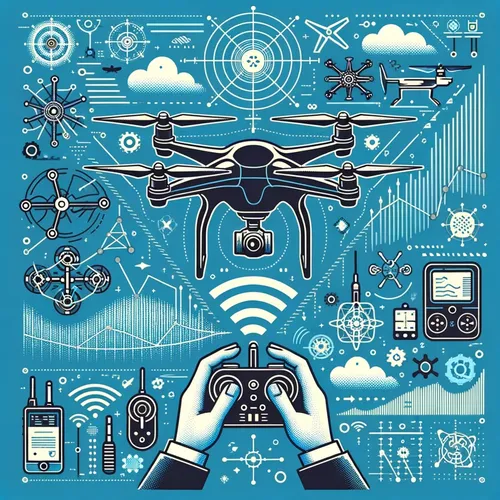Dishing Drone Dirt: Juicy Secrets Powering Big Biz to New Heights
- Author
- Quiet. Please
- Published
- Fri 22 Aug 2025
- Episode Link
- https://www.spreaker.com/episode/dishing-drone-dirt-juicy-secrets-powering-big-biz-to-new-heights--67475702
This is you Commercial Drone Tech: Enterprise UAV Solutions podcast.
Commercial drone technology is redefining enterprise operations, offering tailored unmanned aerial vehicle solutions that drive efficiency, safety, and profitability across key industries. In construction, drones now provide rapid aerial mapping, real-time site progress tracking, and volumetric analysis, leading to cost reductions and tighter timelines. The agricultural sector leverages drone-based multispectral imaging to monitor crop health and precisely distribute fertilizers, directly boosting yields and cutting input costs. The energy industry benefits from automated drone inspections of wind turbines, solar farms, and critical infrastructure, minimizing downtime and reducing risky manual inspections. Infrastructure management teams depend on drones for thorough bridge, railway, and utility inspections, significantly speeding up data collection and reducing risk exposure to field workers.
According to MarketsandMarkets, the global commercial drone market is projected to reach over 58 billion dollars by 2030, underscoring enterprise UAVs as a strategic technology investment. Businesses are reporting ROI through cut labor costs, faster data turnaround, and minimized safety incidents from reduced need for hazardous manned inspections. For example, Shell recently reported saving millions by using drone-based inspections at refineries, while the Kansas Department of Transportation cut bridge inspection time by 80 percent with drone deployment.
Best-in-class drone operations hinge on effective fleet management and seamless integration into business systems. Leading platforms such as Aloft and DJI FlightHub 2 deliver comprehensive cloud-based environments for mission planning, regulatory compliance, real-time asset tracking, and secure pilot management. Top-rated solutions like Airdata UAV and FlytBase enhance post-flight analytics, predictive maintenance, and regulatory reporting, ensuring that fleets remain productive and audits are always ready. Secure data management, automated compliance checks, and scalable software interfaces are now standard, simplifying the roll-out of drones at scale while maintaining regulatory peace of mind. Training is also critical, with industry-specific programs from providers like RMUS and SafetyCulture accounting for software fluency, operational safety, and compliance protocols.
Current news highlights that FAA regulations now mandate remote identification for most commercial drones in the United States. Elsewhere, BP has just announced the launch of one of the largest autonomous drone inspection programs globally for its energy assets, while Deere and Company reported a sharp uptick in smart agricultural drone deployments in response to rising input prices. For enterprises, the action items are clear: select drone hardware and software platforms tailored to industry needs, invest in compliance-driven fleet management, and standardize robust operator training. Future trends crystalize around autonomous drone-in-a-box systems for continuous operations, AI-driven inspection analytics, and advanced airspace integration.
Thank you for tuning in—come back next week for more insights on breakthrough enterprise technology. This has been a Quiet Please production, and for more from me, check out Quiet Please Dot A I.
For more http://www.quietplease.ai
Get the best deals https://amzn.to/3ODvOta
